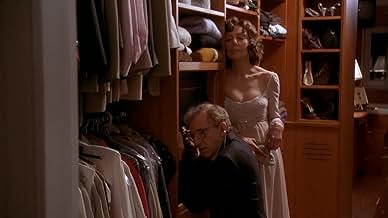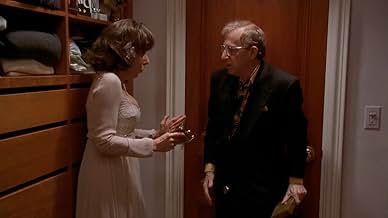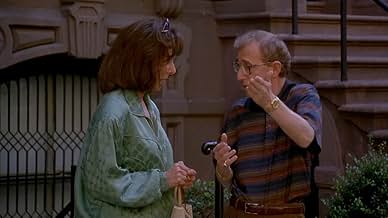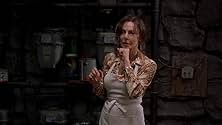Elaine May(I)
- Actress
- Writer
- Script and Continuity Department
Elaine May (born under the name Elaine Iva Berlin) is an American actress, comedian, film director, playwright, and screenwriter from Philadelphia. Her professional career started in the 1950s and is still ongoing. She has twice been nominated for the Academy Award for Best Adapted Screenplay. She is best remembered for directing the Cold War-themed action comedy "Ishtar" (1987). She won the Golden Raspberry Award for Worst Director, but the film has had a vocal minority of critics who defend its quality.
In 1932, May was born to a Jewish-American family. Both her parents were theatrical actors. Her father Jack Berlin was also a theater director and led his own traveling Yiddish theater company. Her mother was actress Ida Aaron. May made her stage debut c. 1935, at the age of 3. Her father had decided to include her in his performances. As a a child actress, she was reportedly cast in the roles of boys.
The theater company toured extensively, and May was part of their tours. She kept changing schools, enrolling for a few weeks and then moving to another city. May reputedly hated school, but loved reading books on her own. Her favorite topics were fairy tales and mythology.
Jack Berlin died c. 1942, and May's career as a child actress consequently ended. She was left in the custody of her mother. The duo settled in Los Angeles, and May eventually enrolled in Hollywood High School. In 1946, May dropped out of school. In 1948, she married her her first husband, the toy inventor Marvin May. She was only 16-years-old at the time of her marriage. She would later keep her husband's surname as her professional name.
In 1949, May had her only child, Jeannie Brette May. Jeannie would later become a professional actress in her own right, under the name Jeannie Berlin. May and her husband separated c. 1950, and she received a divorce in 1960. She started supporting herself through a series of odd jobs.
In 1950, May was interested in attending college, but most colleges in California required applicants to have high school diplomas. As a high school dropout, she did not have the necessary diploma. Learning that the University of Chicago did not use this requirement, she hitch-hiked her way to Chicago, At the time her personal fortune consisted of 7 dollars.
Once she arrived in Chicago, May started informally taking classes at the university by auditing, sitting in without enrolling. She habitually engaged in discussions with her instructors. She once had a fight with a philosophy instructor because of their different interpretations of the motives behind Socrates' apology. May was introduced to aspiring actor Mike Nichols (1931-2014),who was also attending the University. They bonded over their shared passion for the theater.
In 1955, May became one of the charter members of the Compass Players, a Chicago-based improvisational theater group. Nichols joined the group shortly after. The two of them formed a working partnership, jointly developing improvised comedy sketches. May helped the Compass Players to become a highly popular comedy troupe, due to her talent for satire. She helped in the training of novice members of the group.
In 1957, Nichols was asked to leave the Compass Players. His popularity had outshone most members of the group, and had caused internal conflicts. May left the group with him. They then decided to form their own stand-up comedy team, "Nichols and May". Their improvisational skills, and ability to come up with fresh material allowed them to impress their audience.
In 1960, the comedy duo made their Broadway debut, with the show "An Evening with Mike Nichols and Elaine May". A recording of the show won the 1962 "Grammy Award for Best Comedy Album". "Nichols and May" became very popular in New York City, performing in sold-out shows. They also started making appearances in radio and television, and even recorded commercials.
May was reportedly surprised with her own success. She had spend much of her adult life in near-poverty, but she was now earning a regular income from show business. She joked in an interview that she was practically barefoot when she arrived in New York, and now had to get used to wearing high heels.
In 1961, the duo was at the height of their fame. But they decided to dissolve their partnership in order to pursue solo careers. Nichols started working as a Broadway stage director, while May started her new career as a playwright. Her most successful play was "Adaptation" (1969), which she also directed. For her work as a theatrical director, she won the 1969 "Outer Critics Circle Award, Best Director".
May made her debut as a film director with the black comedy "A New Leaf" (1971). It was an adaptation of a short story by Jack Ritchie (1922-1983), depicting the story of an impoverished patrician who marries a wealthy heiress for her money. The main character initially considers murdering his wife to inherit her wealth, but first he has to protect her from other predators who were after her money.
Her first film found little success at the box office, but was praised by critics and was nominated for the "Golden Globe Award for Best Motion Picture - Musical or Comedy". It later earned a reputation as a cult classic, and in 2019 it was selected for preservation by the National Film Registry.
Her second film was the romantic comedy "The Heartbreak Kid" (1972). It concerns a newlywed man who falls madly in love with a younger woman while on his honeymoon. He pursues his romantic interest obsessively despite all signs that his love is unrequited, and despite the disapproval of the woman's protective father. The film was critically acclaimed, and has at times been listed in retrospectives concerning the funniest American films.
In an unusual career move, her third film was not a comedy. It was the rather bleak gangster film "Mikey and Nicky" (1976). It depicts a small-time mobster whose life is in danger, resorting to asking for help from his childhood friend. While creating this film, May got involved in a legal dispute with the film studio Paramount Pictures. The studio eventually decided to only allow a limited release for the film. The film found a niche audience in the home video market, but May's career as a director suffered from this dispute. She was effectively blacklisted.
May decided to focus on her screenwriting career. She found success with the script to the fantasy-comedy "Heaven Can Wait" (1978), about the afterlife of a man who died prematurely. The film was based on a 1938 play by Harry Segall (1892-1975), and also served as a remake to the classic film "Here Comes Mr. Jordan" (1941) which was based on the same play. The film earned about 99 million dollars at the worldwide box office, and was a critical hit. May was nominated for the Academy Award for Best Adapted Screenplay, but the award was instead won by rival screenwriter Oliver Stone (1946-).
During the early 1980s, May mainly worked as an uncredited script doctor. She "polished" scripts by other screenwriters. Her greatest success in this role was the romantic comedy "Tootsie" (1982), for which she wrote several additional scenes. She attempted her comeback as a director with the action comedy "Ishtar" (1987), which became a box office flop for the film studio Columbia Pictures. The film's failure reportedly convinced Columbia's parent company Coca-Cola to sell the under-performing studio to Sony.
"Ishtar" was derided at the time as the worst film of its era by many critics, but was also defended by a vocal minority of critics. It has since attracted a cult audience, who consider this to be a great film. However the film's failure ended May's career as a film director and damaged her reputation. She also ceased working as a screenwriter for several years, reduced to working as an actress again.
May made her comeback as a screenwriter with the comedy film "The Birdcage" (1996), a remake of the European comedy "La Cage aux Folles" (The Cage of Madwomen, 1978). In the film, the openly gay parents to a young man have to pretend to be straight in an attempt to impress their son's prospective in-laws. The film earned about 185 million dollars at the worldwide box office, the greatest hit in May's career up to that point. She was nominated for the "Writers Guild of America Award for Best Adapted Screenplay", but the award was instead won by rival screenwriter Billy Bob Thornton (1955-).
May found more critical success with her next screenplay, for the political film "Primary Colors" (1998). It was an adaptation of the roman à clef novel "Primary Colors: A Novel of Politics" (1996) by Joe Klein (1946-). The novel itself was a fictionalized version of Bill Clinton's 1992 presidential campaign, and depicts an idealistic campaign worker's disillusionment with the politician. The film's cast were nominated for several awards. May herself received her second nomination for the Academy Award for Best Adapted Screenplay, but the award was instead won by rival screenwriter Bill Condon (1955-).
May largely retired from screenwriting since the end of the 1990s. As an actress, she had a supporting role in the crime-comedy "Small Time Crooks" (2000). The film concerned nouveau riche criminals, who attempt to socialize with the American upper class. For this role, she won the "Best Supporting Actress Award" at the National Society of Film Critics Awards.
May lived in retirement until joining the cast of the television mini-series "Crisis in Six Scenes" (2016), her first television role in several decades. The series was created by Woody Allen (1935-), who happened to be an old friend of May.
In 2018, May made a theatrical comeback in Broadway. She played the elderly gallery owner Gladys Green in a revival of the play "The Waverly Gallery" (2000) by Kenneth Lonergan (1962-). In the play, Gladys shows early signs of Alzheimer's disease, and her family has to deal with her mental decline. May received critical acclaim for this role. For this role, she won the 2019 Tony Award for Best Actress in a Play. At age 87, she was the second-oldest winner of a Tony Award for acting.
As of 2021, May is 89-years-old. She is no longer very active, but she reportedly has plans to direct another film. She remains a popular actress.
In 1932, May was born to a Jewish-American family. Both her parents were theatrical actors. Her father Jack Berlin was also a theater director and led his own traveling Yiddish theater company. Her mother was actress Ida Aaron. May made her stage debut c. 1935, at the age of 3. Her father had decided to include her in his performances. As a a child actress, she was reportedly cast in the roles of boys.
The theater company toured extensively, and May was part of their tours. She kept changing schools, enrolling for a few weeks and then moving to another city. May reputedly hated school, but loved reading books on her own. Her favorite topics were fairy tales and mythology.
Jack Berlin died c. 1942, and May's career as a child actress consequently ended. She was left in the custody of her mother. The duo settled in Los Angeles, and May eventually enrolled in Hollywood High School. In 1946, May dropped out of school. In 1948, she married her her first husband, the toy inventor Marvin May. She was only 16-years-old at the time of her marriage. She would later keep her husband's surname as her professional name.
In 1949, May had her only child, Jeannie Brette May. Jeannie would later become a professional actress in her own right, under the name Jeannie Berlin. May and her husband separated c. 1950, and she received a divorce in 1960. She started supporting herself through a series of odd jobs.
In 1950, May was interested in attending college, but most colleges in California required applicants to have high school diplomas. As a high school dropout, she did not have the necessary diploma. Learning that the University of Chicago did not use this requirement, she hitch-hiked her way to Chicago, At the time her personal fortune consisted of 7 dollars.
Once she arrived in Chicago, May started informally taking classes at the university by auditing, sitting in without enrolling. She habitually engaged in discussions with her instructors. She once had a fight with a philosophy instructor because of their different interpretations of the motives behind Socrates' apology. May was introduced to aspiring actor Mike Nichols (1931-2014),who was also attending the University. They bonded over their shared passion for the theater.
In 1955, May became one of the charter members of the Compass Players, a Chicago-based improvisational theater group. Nichols joined the group shortly after. The two of them formed a working partnership, jointly developing improvised comedy sketches. May helped the Compass Players to become a highly popular comedy troupe, due to her talent for satire. She helped in the training of novice members of the group.
In 1957, Nichols was asked to leave the Compass Players. His popularity had outshone most members of the group, and had caused internal conflicts. May left the group with him. They then decided to form their own stand-up comedy team, "Nichols and May". Their improvisational skills, and ability to come up with fresh material allowed them to impress their audience.
In 1960, the comedy duo made their Broadway debut, with the show "An Evening with Mike Nichols and Elaine May". A recording of the show won the 1962 "Grammy Award for Best Comedy Album". "Nichols and May" became very popular in New York City, performing in sold-out shows. They also started making appearances in radio and television, and even recorded commercials.
May was reportedly surprised with her own success. She had spend much of her adult life in near-poverty, but she was now earning a regular income from show business. She joked in an interview that she was practically barefoot when she arrived in New York, and now had to get used to wearing high heels.
In 1961, the duo was at the height of their fame. But they decided to dissolve their partnership in order to pursue solo careers. Nichols started working as a Broadway stage director, while May started her new career as a playwright. Her most successful play was "Adaptation" (1969), which she also directed. For her work as a theatrical director, she won the 1969 "Outer Critics Circle Award, Best Director".
May made her debut as a film director with the black comedy "A New Leaf" (1971). It was an adaptation of a short story by Jack Ritchie (1922-1983), depicting the story of an impoverished patrician who marries a wealthy heiress for her money. The main character initially considers murdering his wife to inherit her wealth, but first he has to protect her from other predators who were after her money.
Her first film found little success at the box office, but was praised by critics and was nominated for the "Golden Globe Award for Best Motion Picture - Musical or Comedy". It later earned a reputation as a cult classic, and in 2019 it was selected for preservation by the National Film Registry.
Her second film was the romantic comedy "The Heartbreak Kid" (1972). It concerns a newlywed man who falls madly in love with a younger woman while on his honeymoon. He pursues his romantic interest obsessively despite all signs that his love is unrequited, and despite the disapproval of the woman's protective father. The film was critically acclaimed, and has at times been listed in retrospectives concerning the funniest American films.
In an unusual career move, her third film was not a comedy. It was the rather bleak gangster film "Mikey and Nicky" (1976). It depicts a small-time mobster whose life is in danger, resorting to asking for help from his childhood friend. While creating this film, May got involved in a legal dispute with the film studio Paramount Pictures. The studio eventually decided to only allow a limited release for the film. The film found a niche audience in the home video market, but May's career as a director suffered from this dispute. She was effectively blacklisted.
May decided to focus on her screenwriting career. She found success with the script to the fantasy-comedy "Heaven Can Wait" (1978), about the afterlife of a man who died prematurely. The film was based on a 1938 play by Harry Segall (1892-1975), and also served as a remake to the classic film "Here Comes Mr. Jordan" (1941) which was based on the same play. The film earned about 99 million dollars at the worldwide box office, and was a critical hit. May was nominated for the Academy Award for Best Adapted Screenplay, but the award was instead won by rival screenwriter Oliver Stone (1946-).
During the early 1980s, May mainly worked as an uncredited script doctor. She "polished" scripts by other screenwriters. Her greatest success in this role was the romantic comedy "Tootsie" (1982), for which she wrote several additional scenes. She attempted her comeback as a director with the action comedy "Ishtar" (1987), which became a box office flop for the film studio Columbia Pictures. The film's failure reportedly convinced Columbia's parent company Coca-Cola to sell the under-performing studio to Sony.
"Ishtar" was derided at the time as the worst film of its era by many critics, but was also defended by a vocal minority of critics. It has since attracted a cult audience, who consider this to be a great film. However the film's failure ended May's career as a film director and damaged her reputation. She also ceased working as a screenwriter for several years, reduced to working as an actress again.
May made her comeback as a screenwriter with the comedy film "The Birdcage" (1996), a remake of the European comedy "La Cage aux Folles" (The Cage of Madwomen, 1978). In the film, the openly gay parents to a young man have to pretend to be straight in an attempt to impress their son's prospective in-laws. The film earned about 185 million dollars at the worldwide box office, the greatest hit in May's career up to that point. She was nominated for the "Writers Guild of America Award for Best Adapted Screenplay", but the award was instead won by rival screenwriter Billy Bob Thornton (1955-).
May found more critical success with her next screenplay, for the political film "Primary Colors" (1998). It was an adaptation of the roman à clef novel "Primary Colors: A Novel of Politics" (1996) by Joe Klein (1946-). The novel itself was a fictionalized version of Bill Clinton's 1992 presidential campaign, and depicts an idealistic campaign worker's disillusionment with the politician. The film's cast were nominated for several awards. May herself received her second nomination for the Academy Award for Best Adapted Screenplay, but the award was instead won by rival screenwriter Bill Condon (1955-).
May largely retired from screenwriting since the end of the 1990s. As an actress, she had a supporting role in the crime-comedy "Small Time Crooks" (2000). The film concerned nouveau riche criminals, who attempt to socialize with the American upper class. For this role, she won the "Best Supporting Actress Award" at the National Society of Film Critics Awards.
May lived in retirement until joining the cast of the television mini-series "Crisis in Six Scenes" (2016), her first television role in several decades. The series was created by Woody Allen (1935-), who happened to be an old friend of May.
In 2018, May made a theatrical comeback in Broadway. She played the elderly gallery owner Gladys Green in a revival of the play "The Waverly Gallery" (2000) by Kenneth Lonergan (1962-). In the play, Gladys shows early signs of Alzheimer's disease, and her family has to deal with her mental decline. May received critical acclaim for this role. For this role, she won the 2019 Tony Award for Best Actress in a Play. At age 87, she was the second-oldest winner of a Tony Award for acting.
As of 2021, May is 89-years-old. She is no longer very active, but she reportedly has plans to direct another film. She remains a popular actress.








































